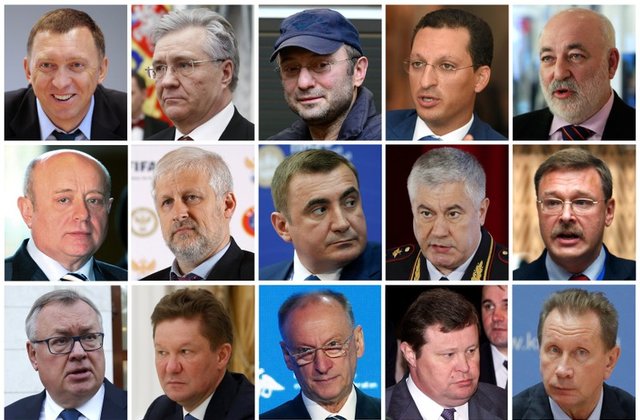U.S. slaps sanctions on Putin cronies for Russia's 'malign activity'
 |
| A combination of photos show prominent Russian businessmen and officials on a U.S sanctions list released by the Department of Treasury. Reuters |
The action, taken under pressure from the U.S. Congress, freezes the U.S. assets of oligarchs such as aluminum tycoon Oleg Deripaska, a close associate of Putin, and lawmaker Suleiman Kerimov, whose family controls Russia’s largest gold producer, Polyus.
The sanctions largely respond to what U.S. intelligence agencies have said was Russian interference in the presidential election, although the Treasury Department painted them as a response to a series of adversarial actions by Moscow.
U.S. President Donald Trump has been under fire for not taking strong action against Russia after a series of diplomatic disputes reminiscent of the Cold War era. The sanctions could complicate his hopes for good relations with Putin.
Relations already had worsened recently as the United States expelled Russian diplomats over a poisoning case in Britain and imposed sanctions on Russians for alleged links to cyber attacks.
The latest move is aimed at seven Russian oligarchs and 12 companies they own or control, plus 17 senior Russian government officials. They freeze the U.S. assets of the people and companies named and forbid Americans in general from doing business with them.
Trump has faced criticism - including from fellow Republicans - for doing too little to punish Russia for the election meddling. The U.S. Treasury Department said the sanctions were in response to Russia’s “malign activity,” including its actions in Ukraine, its support of President Bashar al-Assad in Syria’s civil war and subverting Western democracies.
U.S. intelligence agencies last year accused Russia of using hacking, false information and propaganda to disrupt the 2016 elections and try to ensure Trump defeated Democratic candidate Hillary Clinton. Russia denies interfering in the election.
Preparations for a meeting between Trump and Putin will not be affected by the sanctions, the White House said.
“As the president has said, he wants to have a good relationship with Russia but that’s going to depend on some of the actions by the Russians,” White House press secretary Sarah Sanders told reporters.
Russia said it would respond firmly to the sanctions.
“Of course we will not leave this current and any new anti-Russian attack without a harsh answer,” Russia’s foreign ministry said in a statement. “But first of all we would like to recommend that Washington discard illusions that we can be spoken to in the language of sanctions.”
OLIGARCHS AND ELITES
The sanctions could hurt the Russian economy, especially the aluminum, financial and energy sectors, and are a clear message to Putin and his inner circle of U.S. displeasure.
Others on the sanctions list include Viktor Vekselberg, key owner of Renova holding group who Forbes magazine ranks as Russia’s 9th richest businessman. He is famous for bringing back a collection of Faberge eggs to Russia.
Also targeted is Kirill Shamalov, a minority shareholder with petrochemical company Sibur. Shamalov married Putin’s youngest daughter Katerina in 2013 but unconfirmed media reports say they have since split.
The CEO of Russia’s gas exporter Gazprom, Alexei Miller, said he was proud to be targeted by sanctions.
“Not being included in the first list I even had some doubts - maybe something is wrong (with me)? But I am finally included. This means that we are doing everything right,” Miller said through his spokesman, referring to an earlier U.S. list of Russian oligarchs.
Gazprom has relationships with major foreign companies, especially in Europe. Gazprom itself is not under sanctions, but the inclusion of Miller on the blacklist could create complicated legal dilemmas for partner companies. Although they are under European Union jurisdiction, they will not want to fall foul of any U.S. legislation
Deripaska’s blacklisting will also reverberate around the world because his empire has a global footprint and counts major multinationals as partners, including German automaker Volkswagen.
Deripaska called the decision to target him “very unfortunate but not unexpected.”
“Certainly the grounds for putting my name on the list of SDNs as provided by U.S. officials are groundless, ridiculous and absurd,” he said, in a statement sent to Reuters by a spokesperson for his industrial group Basic Element. SDN stands for “Specially Designated National.”

